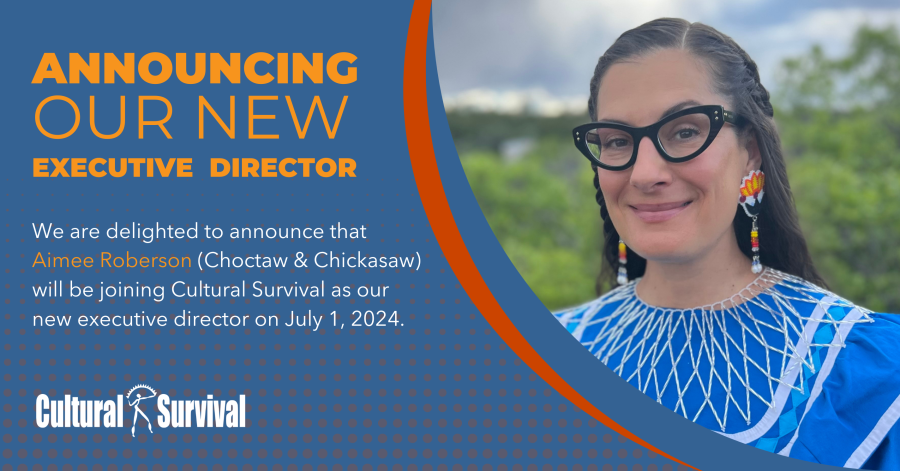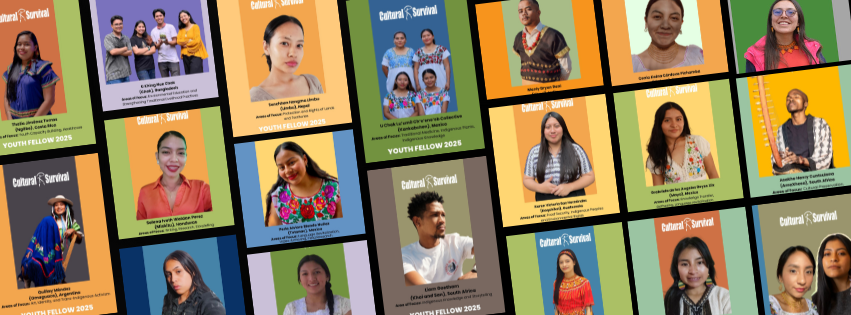
Cultural Survival is excited to announce our 2025 cohort of Indigenous Youth Fellows as part of our Capacity Building Program. Our Indigenous Youth Fellowship supports young Indigenous leaders aged 18-28 who are dedicated to transforming their communities and creating opportunities to elevate, defend, and strengthen their cultures and traditional knowledge practices while developing leadership, organizational, and project management skills. Since 2018, we have awarded 157 fellowships supporting over 350 youth from around the globe.
The fellowship projects address important issues such as climate change, food sovereignty, decolonization, language revitalization, land protection, media and art, and the reclaiming of traditions. Indigenous youth play a crucial role in driving change, and their active involvement is essential for passing on ancestral knowledge and ensuring the continuity and vibrancy of their cultures. Join us in celebrating Indigenous youth talent, creativity, and unwavering dedication worldwide.
Meet our 2025 Fellows
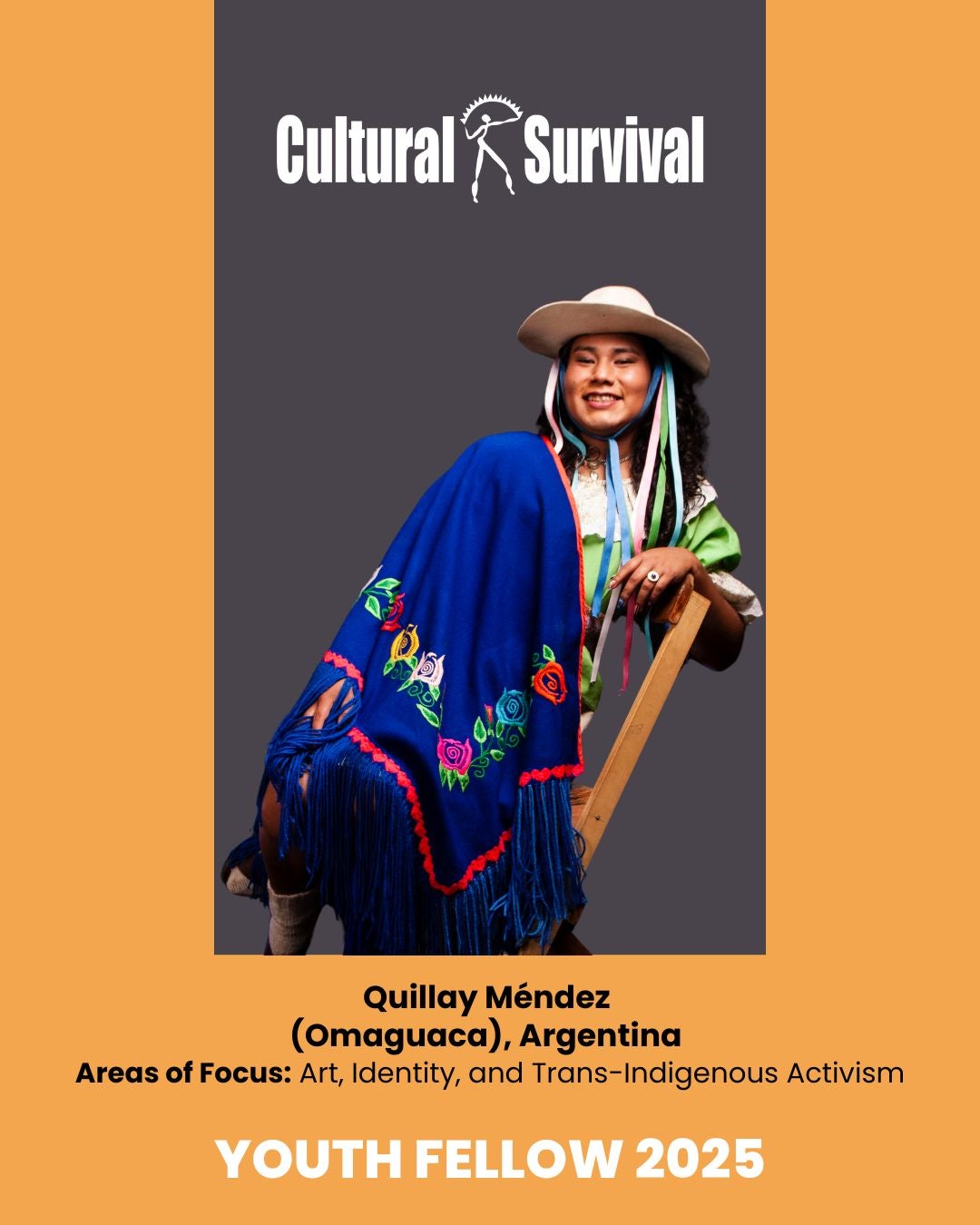
Quillay Mendez (Omaguaca), Argentina
Areas of Focus: Art, Identity, and Trans-Indigenous Activism
Quillay Méndez, an Indigenous trans artist from the Omaguaca nation, is an expert dancer in folk, Andean, and African-American dances. She currently works as a multidisciplinary performer, cultural agent, and researcher on gender, race, and performance. Her art, nourished by her territory and ancestral memory, fuses ritual with neo-conceptual perspectives. Quillay also teaches Body Expression and Technique in Folk Music (ISA) and facilitates workshops in Dance-Movement and Ancestral Singing with box drums.
Quillay is pursuing her grant project, “SuriLithium.” This is a video performance that critically explores lithium mining in Jujuy, Argentina. Through ritual dance and performance, the project seeks to generate a critical and reflective dialogue on the environmental and social impacts of this economic and political activity.
Within the framework of this project, the scholarship recipient will produce a live performance rooted in ancestral traditions (rituals and dances), complemented by community activities to promote dialogue and collective resistance among Indigenous communities. This initiative, which integrates audiovisual elements, performance, and community participation, seeks to generate new perspectives on the liberation and empowerment of Indigenous and LGBTTIQNB+ communities, encouraging cultural preservation through artistic expression that fosters social change.
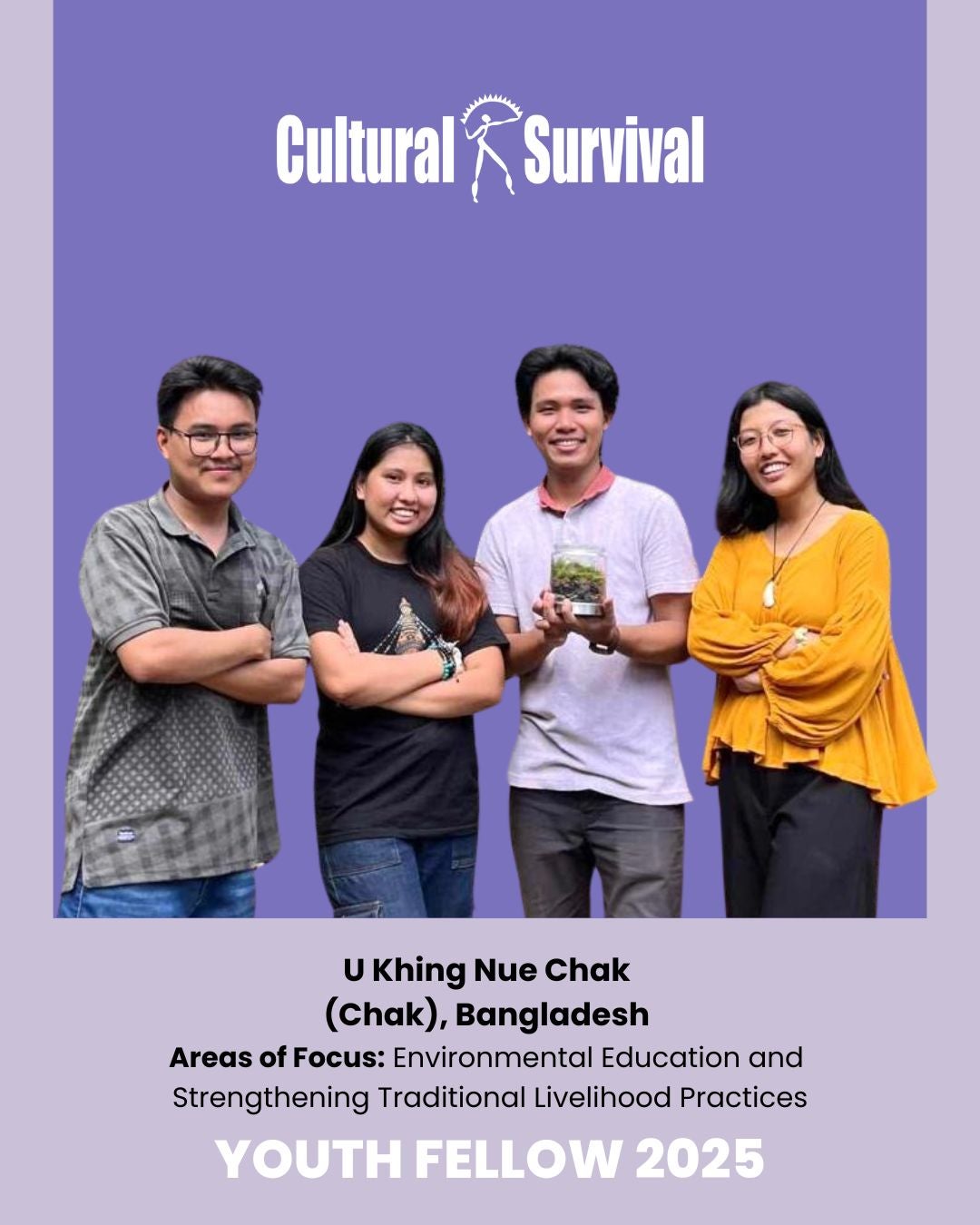
U Khing Nue Chak (Chak), Bangladesh
Areas of Focus: Environmental Education and Strengthening Traditional Livelihood Practices
Ukhing Nue Chak (Chak) is an Indigenous rights advocate from the Chak community in the Bandarban Hill Tracts of Bangladesh. She has dedicated her career to preserving Indigenous knowledge, strengthening traditional livelihood practices, and promoting sustainable entrepreneurship among Indigenous women and youth. Through her grassroots initiatives and advocacy work, she strives to bridge the gap between cultural heritage and economic empowerment, ensuring the resilience of Indigenous communities.
Together with Ushing Mya Marma (Marma), Chaw Way Hai Marma (Marma), and Puchainu Marma (Marma), Chak is coordinating the collective fellowship project, “BIRDS: Bandarban Indigenous Roots Development and Sustainability,” which aims to preserve the cultural traditions of the Chak, Khyang, Tripura, Marma, and Tanchagya communities with a focus on traditional weaving. Recognizing the risk of cultural loss, the project seeks to engage youth in learning and continuing these practices, ensuring their transmission to future generations.
The objectives of the project include empowering women from six communities through weaving skills and entrepreneurship, preserving cultural heritage by documenting weaving techniques, organizing "Barefoot Forest" campaigns to connect youth with ecological practices, and fostering community development by establishing a resource center for woven products. Ultimately, the project strives to maintain the community’s connection to its roots while fostering pride in its cultural legacy.
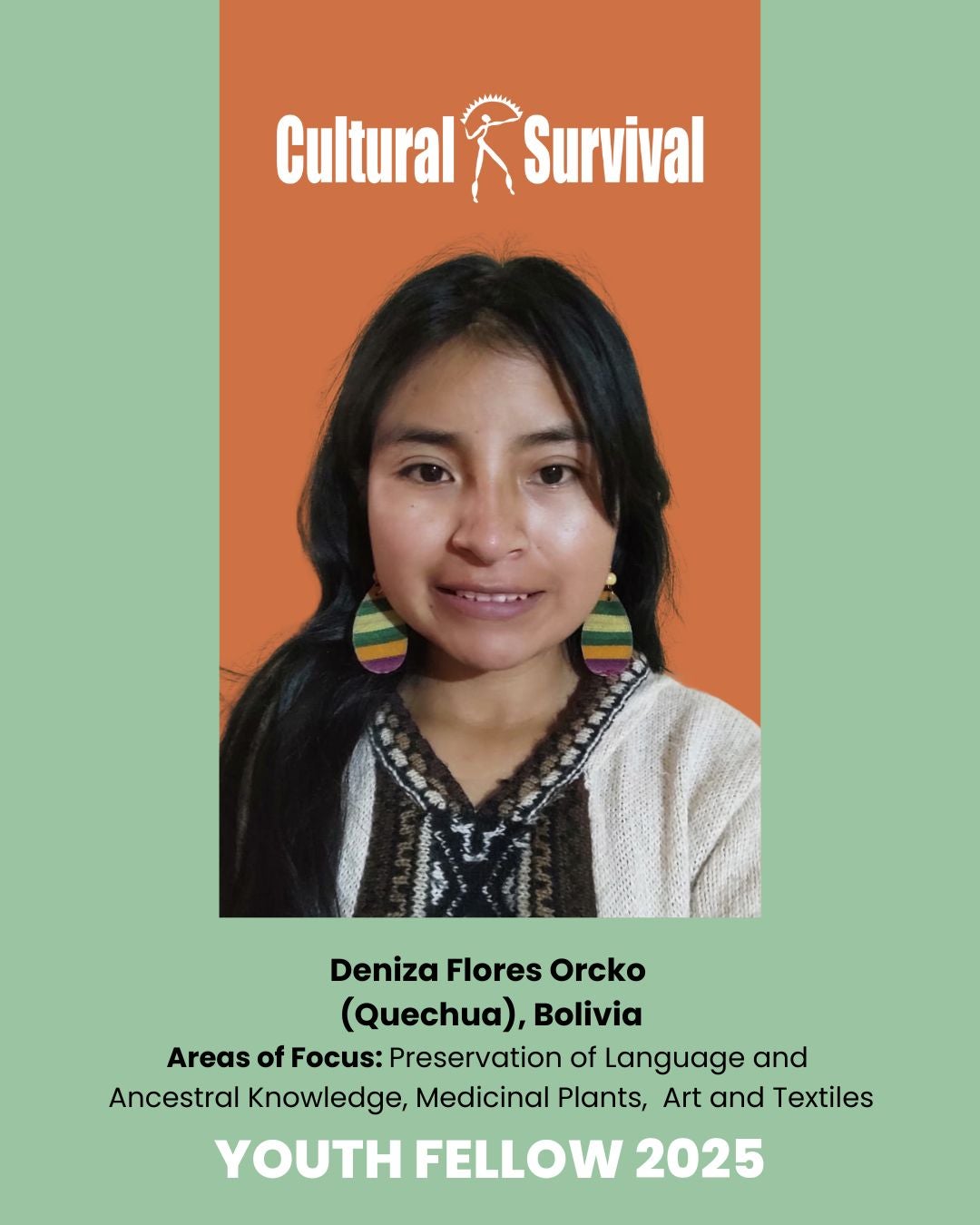
Deniza Flores Orcko (Quechua), Bolivia
Areas of Focus: Revitalization of Language and Ancestral Knowledge, Medicinal Plants, and Art and Textiles.
Deniza Flores Orcko (Quechua) was born in the community of Chaquilla Alta, Potosí, Bolivia. She is an agro-industrial engineer and is currently studying graphic and web design. A journalist-in-training, she has a passion for environmental and cultural communication and works to highlight socio-environmental issues such as mining pollution and access to clean water. Orcko creates educational content for YouTube and radio, promotes urban gardening and community forestry, reports on topics related to her environment, and encourages the development of entrepreneurship.
Orcko’s fellowship project, “Tinkunakuy (Reuniting): Weaving Knowledge," aims to promote the preservation of Quechua language and ancestral knowledge of medicinal plants by creating artisanal textiles that depict cultural symbolism. This process will be documented through audiovisual content in order to educate and raise awareness among a wider audience about the importance of keeping these valuable traditions alive.
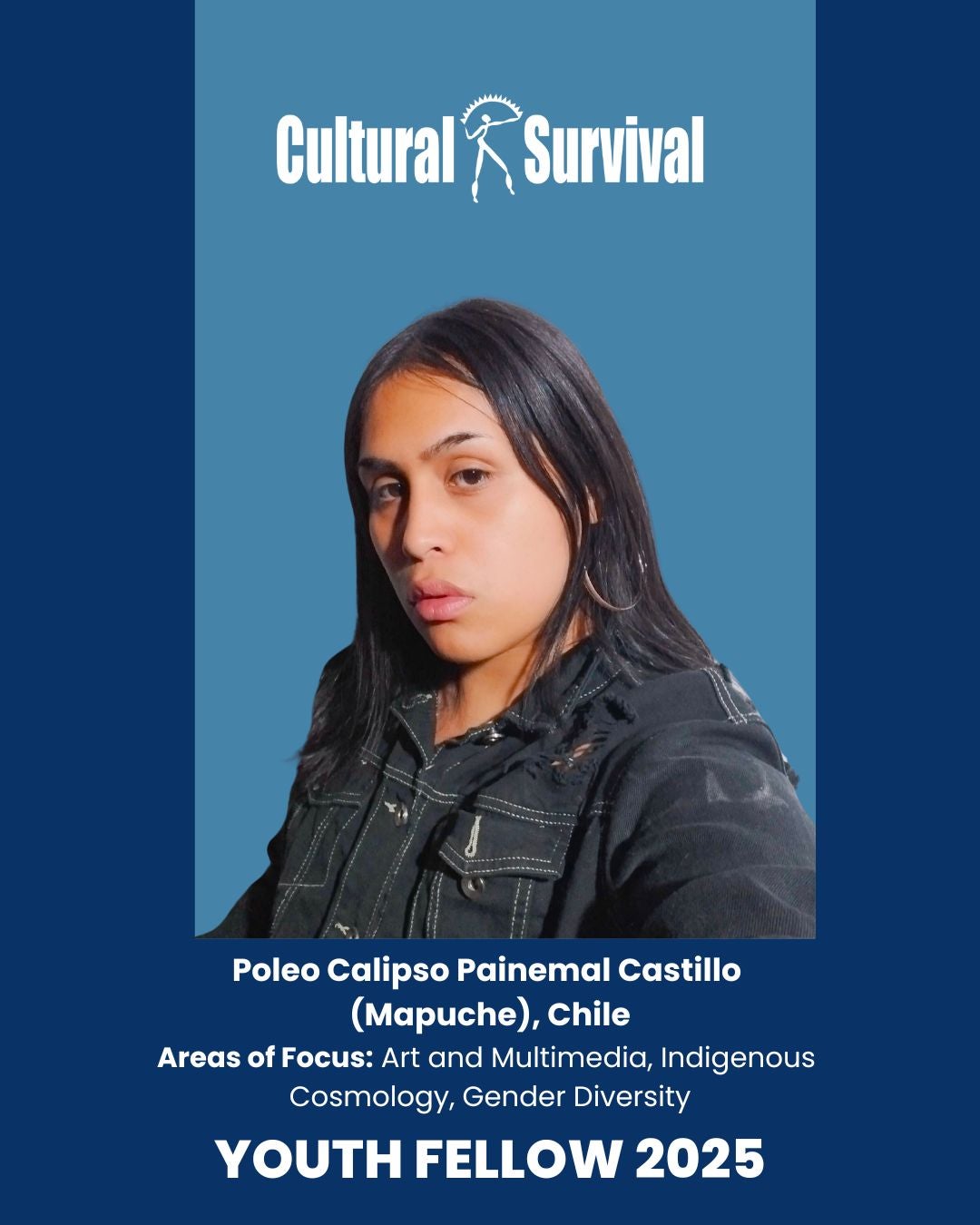
Poleo Calipso Painemal Castillo (Mapuche), Chile
Areas of Focus: Art and Multimedia, Indigenous Cosmology, Gender Diversity
Poleo Calipso Painemal Castillo (Mapuche) is a Trans woman and artist born in Temuco, Chile. She specializes in painting, murals, and illustration, often using water-based enamel on large surfaces, and has participated in several group exhibitions and art events in Santiago. In 2023 she received recognition from the Municipality of Santiago for her striking mural work. At the end of 2024, she exhibited her works at the German embassy, which resulted in the honor of meeting the President of Germany. Castillo currently lives in Santiago and is in her last year of Illustration at the ARCOS Institute. Through her art, she explores the Trans reality using both her own and borrowed experiences, which, together with her artistic expression that is deeply rooted in her Mapuche identity, give context to the current Trans scene.
Castillo’s fellowship project aims to promote the understanding and appreciation of Indigenous cosmology by focusing on the creation and exhibition of portraits and videos of Indigenous people with diverse gender identities. Ultimately, it aims to foster respect for these people and preserve their cultural heritage.
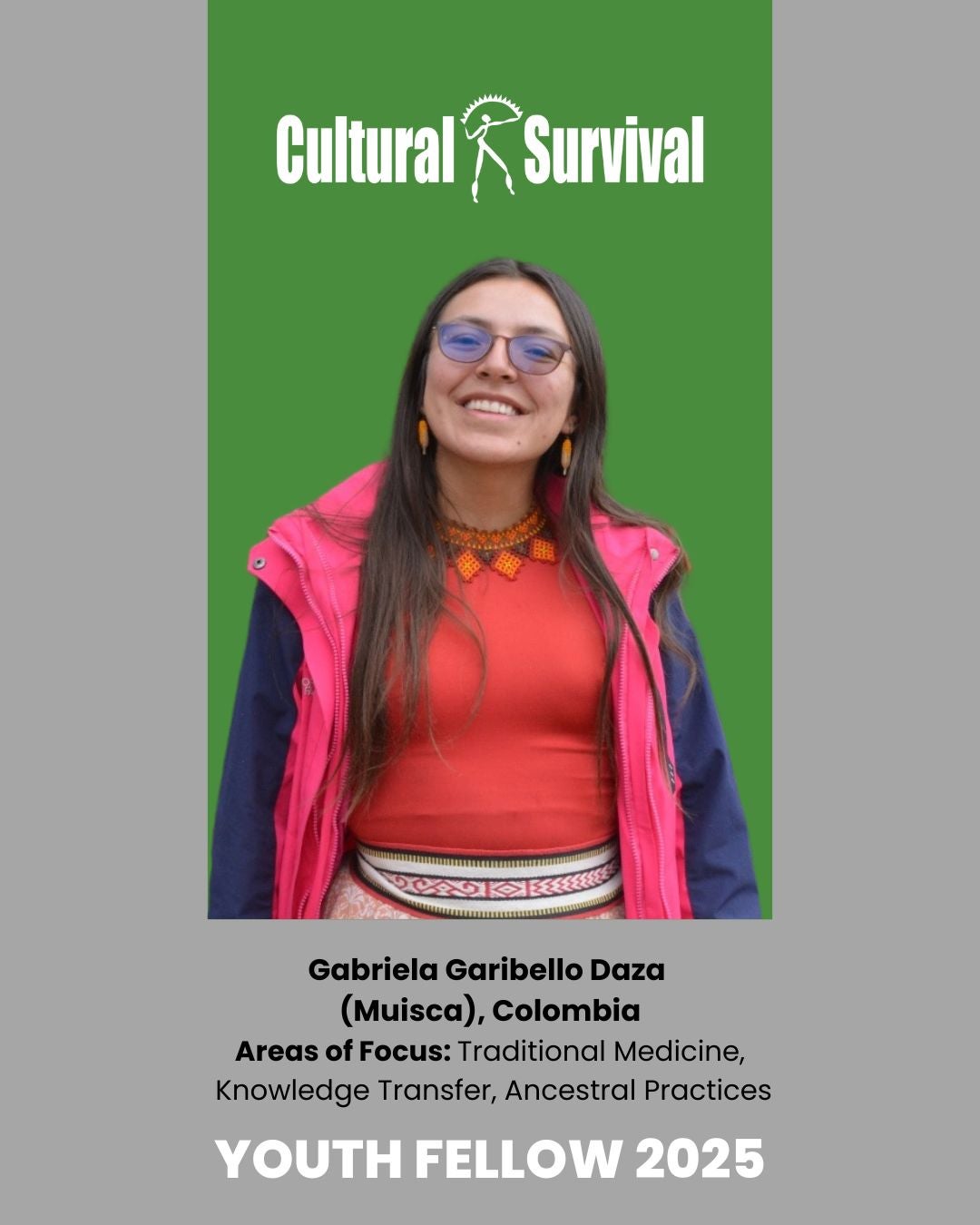
Gabriela Garibello Daza (Muisca), Colombia
Areas of Focus: Traditional Medicine, Knowledge Transfer, Ancestral Practices
Gabriela Garibello Daza (Muisca) from Bogotá, Colombia, works to preserve and revitalize the culture and language of her people. As co-founder of the Tinzi Indigenous Collective, she leads an initiative to revive the native Bosa language. A graduate in Literary Studies from the Javeriana University, Gabriela is currently studying ancestral medicine and Muisca midwifery. She has worked with several Indigenous communities on issues related to oral tradition, education, cultural identity, health, and ancestral medicine. As a researcher and writer, she published her first text in 2022, followed by two poems in 2023. Her recent publication, “Mhuysqa Tchie Kiqa (Muisca Sacred Sites),” explores Muisca sacred sites through oral traditions and personal experiences. Daza’s work builds bridges between Traditional Knowledge and contemporary expressions through writing and community engagement, and she actively collaborates with her community and other groups on various cultural issues.
Together with the support of Erika Samantha Galeano (Muisca) , Wendy Lorena Díaz Pachón (Muisca), and Deina Catherin Tovar (Muisca), Daza is coordinating the collective project, “Escuela de formación en medicina natural de mujer y partería tradicional muisca (School of Training in Natural Medicine and Traditional Muisca Midwifery).” This project seeks to transmit the practice of Muisca midwifery and strengthen knowledge of traditional medicine in order to preserve ancestral wisdom in women's healthcare.
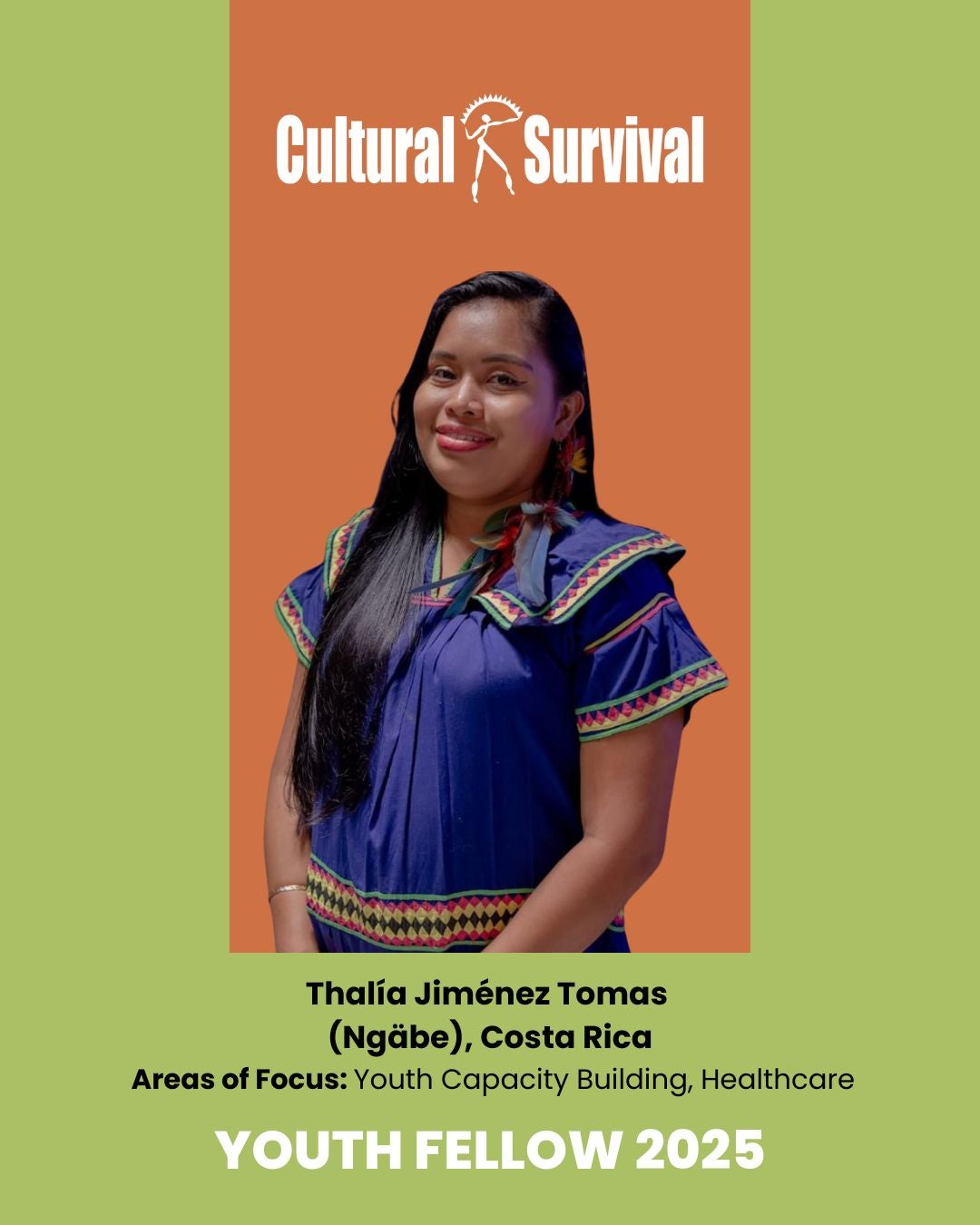
Thalia Jimenez Tomas (Ngäbe), Costa Rica
Areas of Focus: Youth Capacity Building, Healthcare
Thalia Jimenez Tomas (Ngäbe) is co-founder of the Ngäbe Women Leaders of Sixaola. She graduated from the Distance State University (UNED) with a degree in Local Management for Indigenous Peoples. Tomas played a significant role in the creation of Law Number 9710 in 2018, which addresses the naturalization of cross-border Indigenous people in Costa Rica. In 2019, she received leadership training through Nosotras: Women Connecting, a nonprofit organization promoting female leadership in Latin America and Kenya. Currently, she facilitates discussions with the United Nations Population Fund to address the sexual and reproductive health rights of Ngäbe women in Sixaola. In recognition of her work with the Indigenous Women's Organization, the European Union awarded her the Gender Equality Prize in 2024 for her efforts in promoting the rights of the Ngäbe people.
Tomas is coordinating the collective project, “Meritre krägae Dean nain, migatrë gare monsotre ngäbere (A Vision for Ngäbe Youth on Maternal Health).” This initiative aims to enhance knowledge and provide training for young people in maternal and intercultural health while fostering respect for the Ngäbe worldview in the healthcare sector. A key component of the project is to increase visibility and strengthen collaboration between cultural advisors and healthcare personnel.
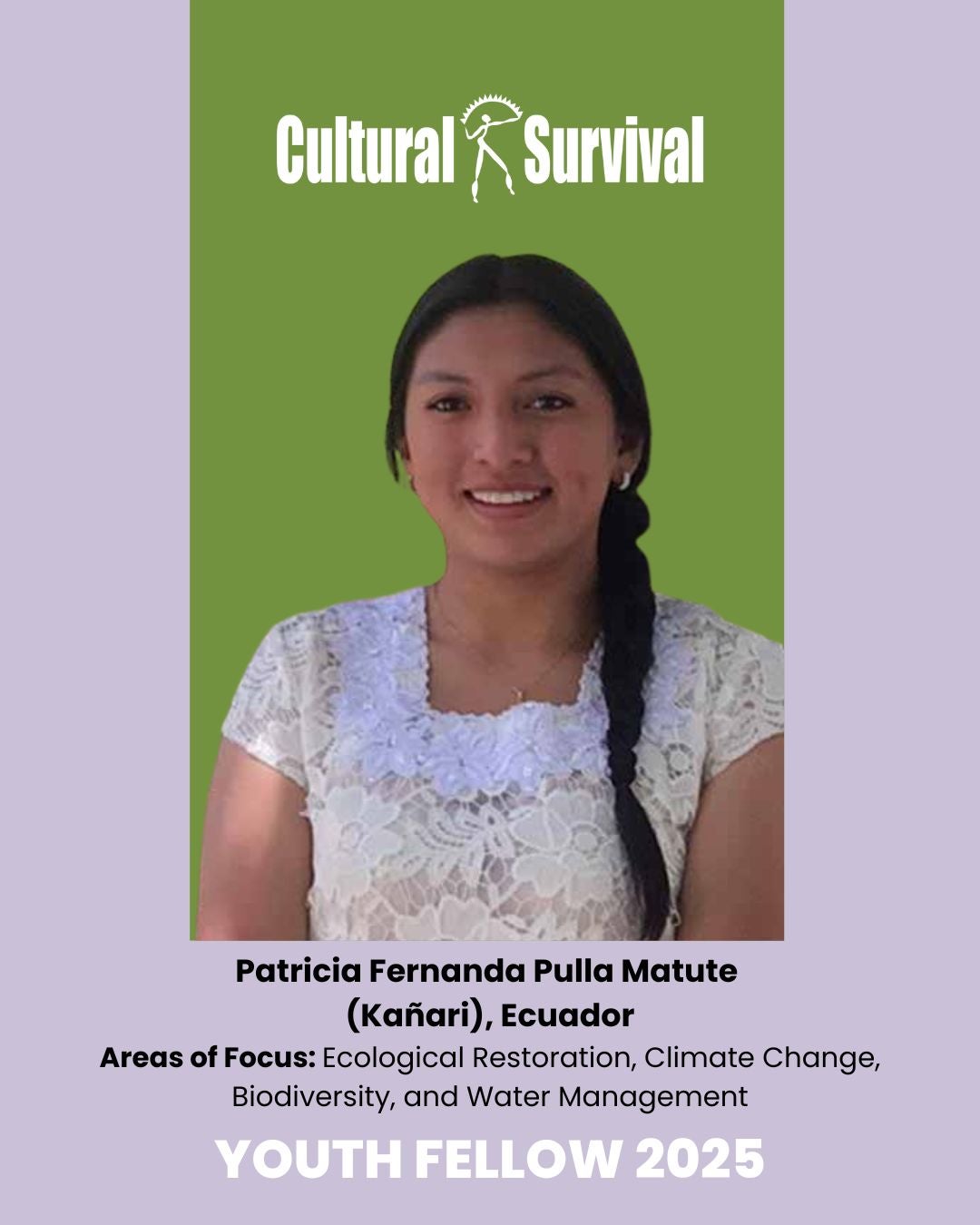
Patricia Fernanda Pulla Matute (Kañari), Ecuador
Areas of Focus: Ecological Restoration, Climate Change, and Water Management.
Fernanda Pulla (Kañari) is studying to be a physical therapist at the University of Cuenca. The experience of watching her grandmother practice traditional medicine in the parish of San instilled in her the importance of preserving nature from an early age. Threats posed by hydroelectric and mining projects to protected areas motivated her to take action, and Pulla, with her family, would go on to join an organization dedicated to protecting their home. She later served as secretary of the Coordinadora de Comunidades Ancestrales de San Joaquín, a role that provided her with valuable experience and diverse perspectives on environmental activism. Pulla is deeply committed to defending nature and her community's ancestral lands. Her background in health and community organizing reflects a holistic approach to well being and environmental protection.
Together with Nely Maribel Huerta Otavalo, Sandra Marina Morocho Naula, Tania María Morocho Naula, Deysi Patricia Jarama Morocho, and Herica Huerta, Pulla is leading the collective project, “Warmi Ñan” (Women's Path). This initiative focuses on the ecological restoration of water recharge areas in the Azuay páramo, which have been affected by forest fires and climate change. The project will establish a community nursery for native plants, combining their cultivation with the recovery of ancestral water management practices. By empowering local women and youth, “Warmi Ñan” seeks to protect biodiversity and ensure the equitable and sustainable use of water resources.

Cenia Kaina Córdova Pichamba (Kichwa), Ecuador
Areas of Focus: Indigenous Knowledge Revitalization, Empowerment of Indigenous Women
Cenia Córdova (Kichwa) is from Peguche, Imbabura, Ecuador. She holds a degree in Art and Humanities and has furthered her studies in anthropology, research, and heritage. Throughout her career, she has worked in museum development, book publishing, and cultural outreach, gaining international experience as a speaker in Norway. Driven by a commitment to highlight and reclaim the identity and visual culture of Indigenous communities, Córdova focuses on the importance and vulnerability of Kichwa culture and its ancestral knowledge.
Córdova’s project, “Yuyaykuna” (Knowledge), aims to highlight Indigenous science. Recognizing that Indigenous communities, especially rural ones that have been historically marginalized, possess invaluable, intangible knowledge at risk of disappearing, it seeks to empower Indigenous women, who are the knowledge holders, and to make their wisdom more accessible.
The project will compile and share this knowledge through oral history recordings, photographs, dialogue workshops, and talks that focus on topics such as identity, race, interculturality, and health.
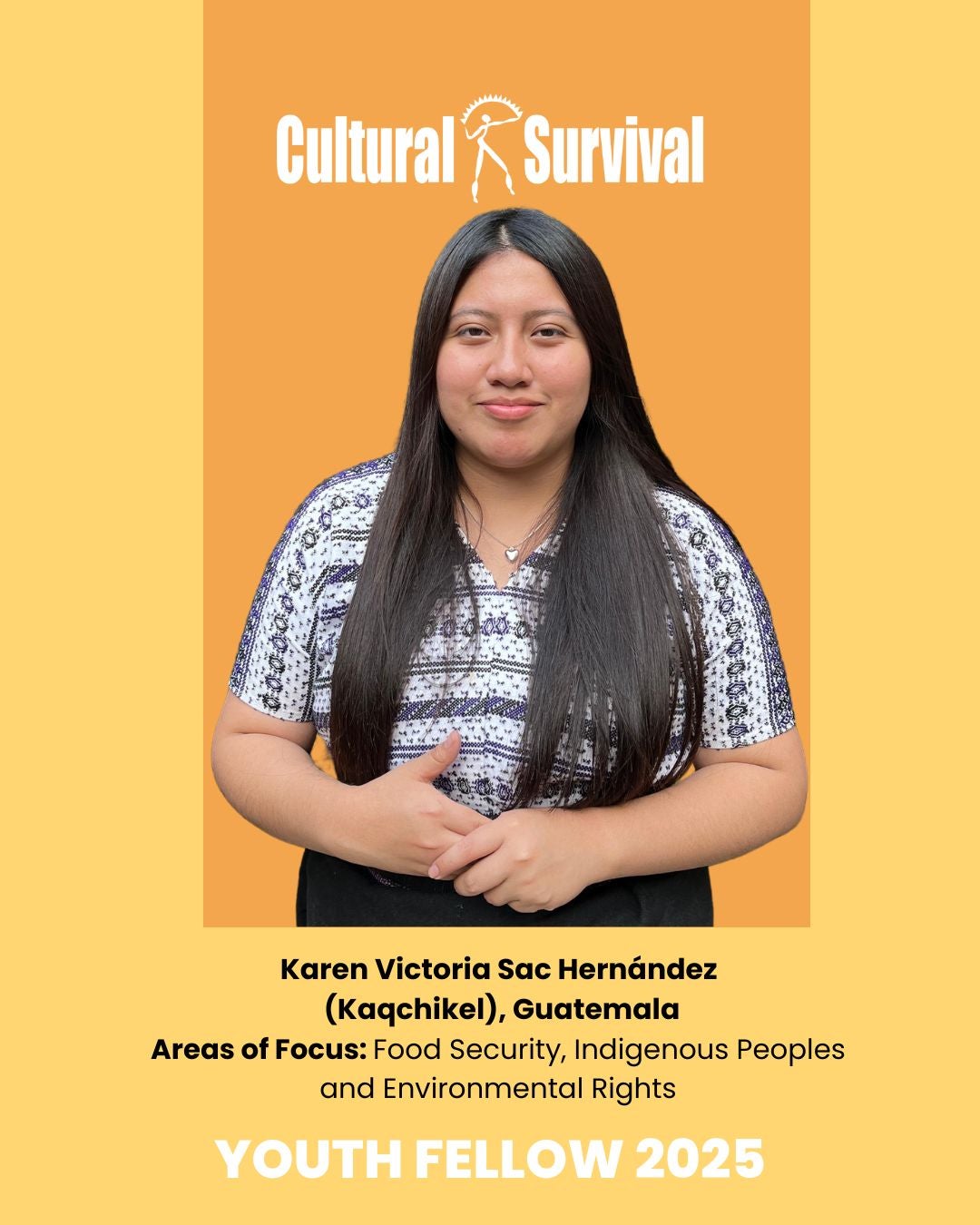
Karen Victoria Sac Hernandez (Kaqchikel),Guatemala
Areas of Focus: Food Security, Indigenous Peoples and Environmental Rights
Karen Victoria Sac Hernández is a 21-year-old Maya Kaqchikel woman from Chimaltenango, Guatemala. Keren, a student of Legal and Social Sciences, began her activism at the age of 15 as a student leader. Her motivation arose from the environmental problems that were negatively impacting her community due to a harmful hydroelectric power plant. Since then, she has focused on empowering and leading Mayan youth, earning sociocultural titles such as “Rumi'al B'oko'” (Daughter of Chimaltenango) and “Rumi'al Yum Kax” (Daughter of Maize). Karen actively organizes peaceful informational talks and implements reforestation campaigns to protect Mother Earth and safeguard her community's territory.
Her fellowship project, called “Tiqatika' etamab'alil pa ruchojmilal” (Sprouting Organic Knowledge), aims to empower indigenous youth by involving them in community food production and forest protection, thereby promoting environmental management and improving local food security.
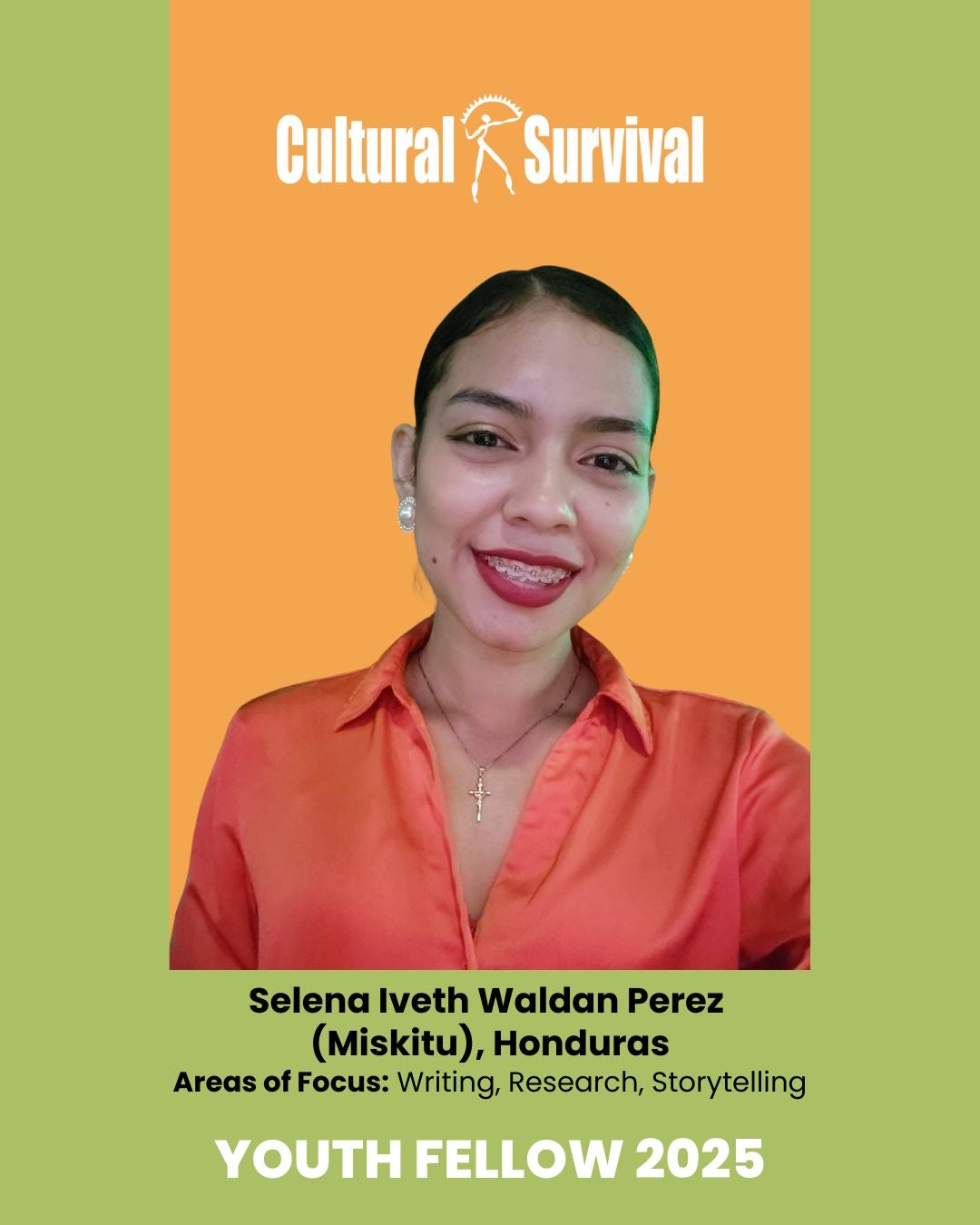
Selena Iveth Waldan Perez (Miskitu), Honduras
Areas of Focus: Writing, Research, Storytelling
Selena Iveth Waldan Pérez is originally from the Miskitu ethnic group in Gracias a Dios, Honduras. She is currently pursuing a degree in Education. In addition to her studies, she serves as the President of the Municipal Youth Commission of Puerto Lempira and is a member of the Board of Directors for the Afro-Indigenous Youth Network of Honduras. For the past two years, she has volunteered in various civil society initiatives. Perez aspires to share the rich history of her beautiful region of diverse communities and Nations, aiming to raise awareness about the importance of caring for and preserving Indigenous cultures.
Perez’s project, “La Historia No Contada Del Pueblo Miskitu (The Untold Story of the Miskitu People),” aims to create a book that compiles the history and culture of her community. To achieve this, she will conduct field research, formulate the data, and edit the collected information to produce the book.
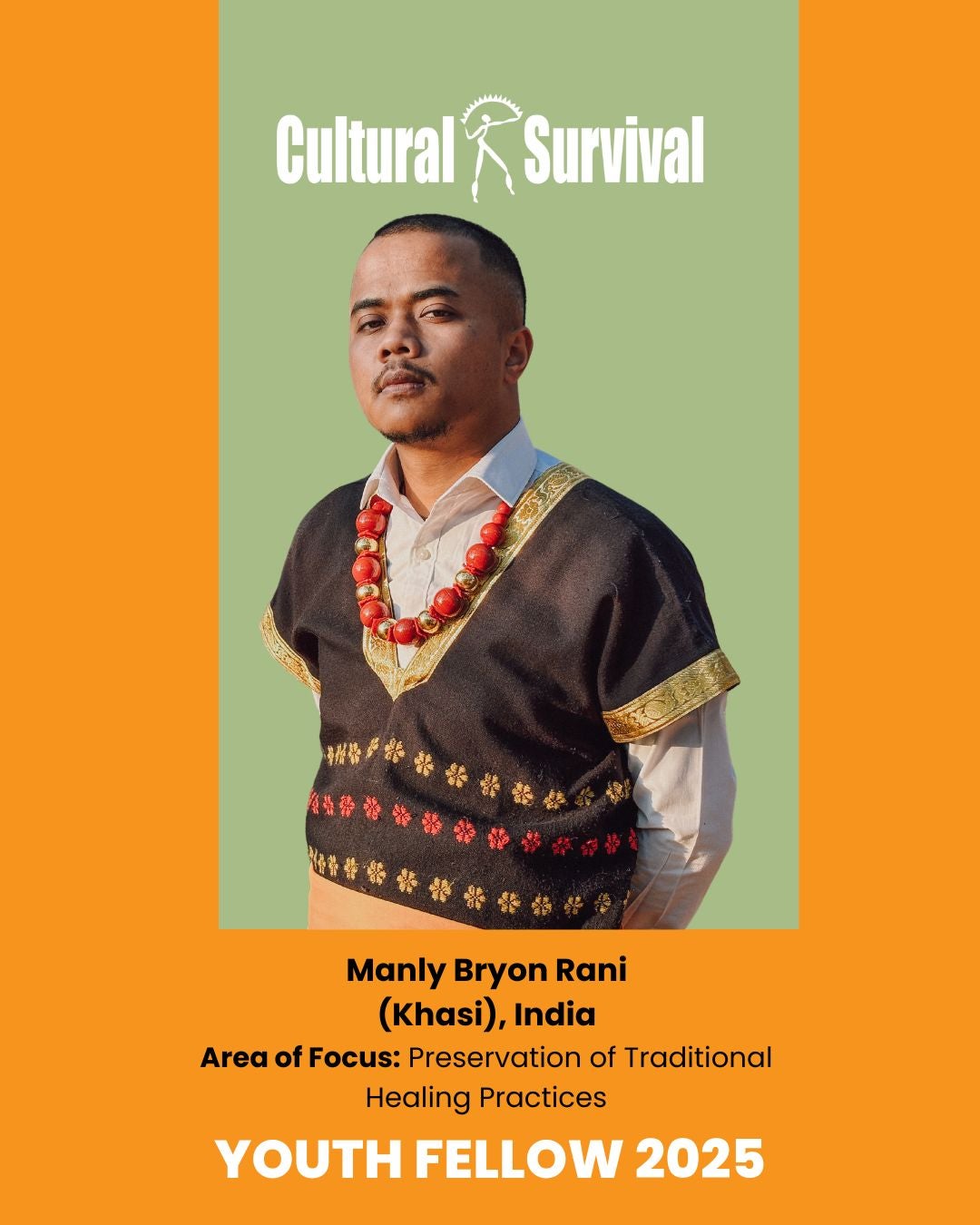
Manly Bryon Rani (Khasi), India
Area of Focus: Preservation of Traditional Healing Practices
Manly Bryon Rani (Khasi) is a documentary filmmaker from Shillong, Meghalaya, India. He holds a master’s degree in Electronic Media and Mass Communication and is passionate about capturing Indigenous stories, particularly those of his Khasi community. His work focuses on preserving Traditional Knowledge, ensuring that ancestral wisdom is documented and shared with future generations.
Rani’s fellowship project, “Guardians of Wisdom: Traditional Healing Practices of Laitmawsiang and Kongthong,” aims to document, preserve, and promote the traditional healing practices of the Khasi Indigenous community in the Laitmawsiang and Kongthong villages of Meghalaya. Through this project, which will include producing a documentary and a bilingual magazine, he seeks to record healing methods and ecological wisdom, foster cultural pride by highlighting unique Khasi practices, raise global awareness about the importance of these traditions for sustainable living and holistic wellness, and empower Indigenous youth by involving them in the documentation process. The goal is to ensure the long-term preservation and revitalization of Khasi Indigenous practices as a vital part of their community's identity and a significant element of global cultural heritage.
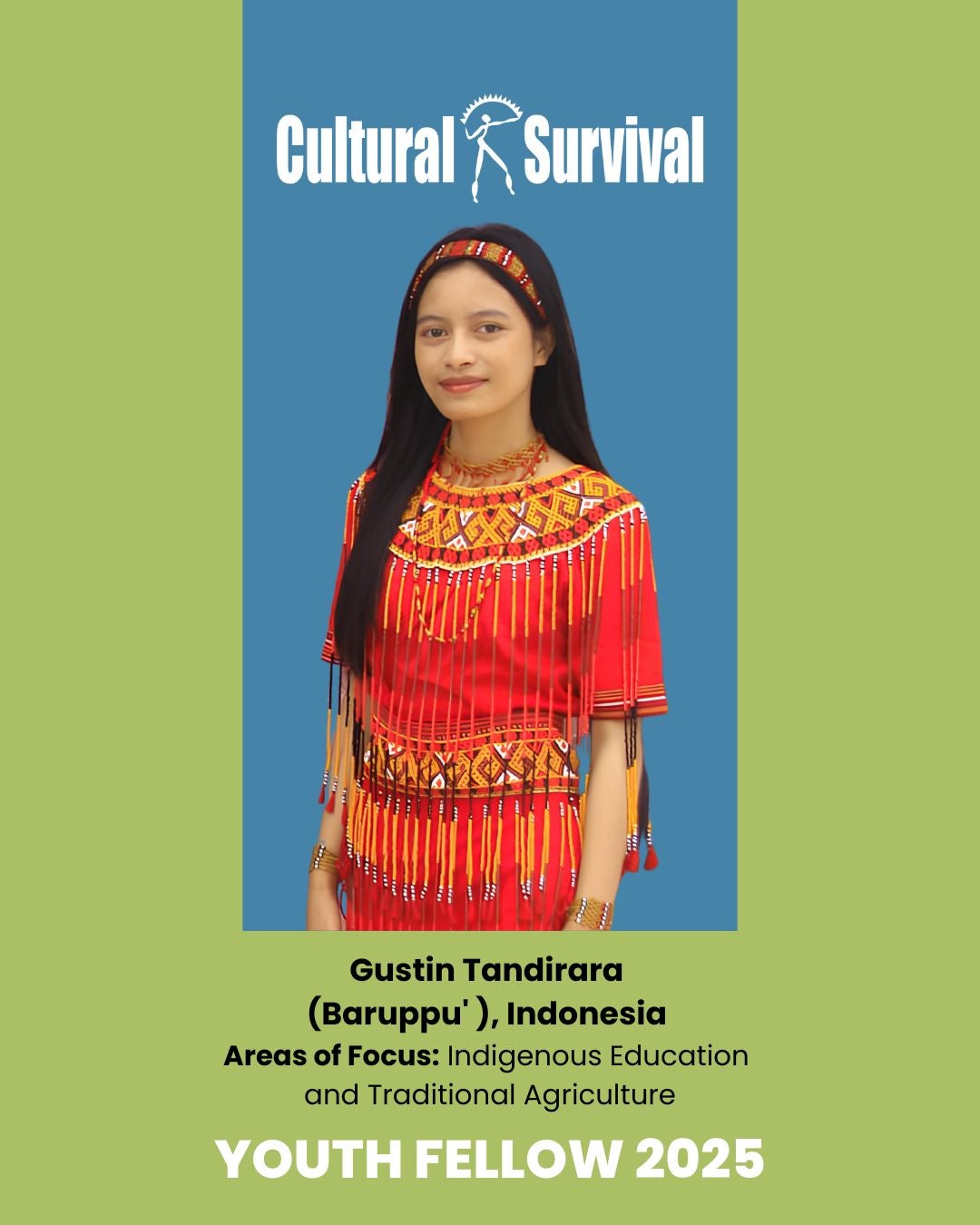
Gustin Tandirara (Baruppu'), Indonesia
Areas of Focus: Indigenous Education and Traditional Agriculture
Gustin Tandirara (Baruppu’) is from Sulawesi, Indonesia, belonging to the Tandirara clan of the Toraja Tribe. She is dedicated to empowering Indigenous children through the integration of Traditional Knowledge with formal education. She co-founded Melada Sisola Baruppu', an initiative that combines Indigenous wisdom, traditions, and language with the standard academic curriculum. Through this program, Tandirara aims to provide culturally relevant education, ensuring that Indigenous children gain both academic knowledge and a strong connection to their ancestral roots.
Tandirara’s project, “Melada Sisola Baruppu’ (Learning Together with My Friends in Baruppu’),” focuses on safeguarding and strengthening the cultural heritage, agricultural practices, and environmental stewardship of the Baruppu' Indigenous community through establishing the Indigenous school of Melada Sisola Baruppu'. Tandirara seeks to empower youth by blending Traditional Knowledge with modern education, fostering cultural pride and sustainable leadership. The revival of Upe' cultivation, a crop of cultural significance, will be supported through hands-on training, preserving traditional farming methods, and ensuring food security.
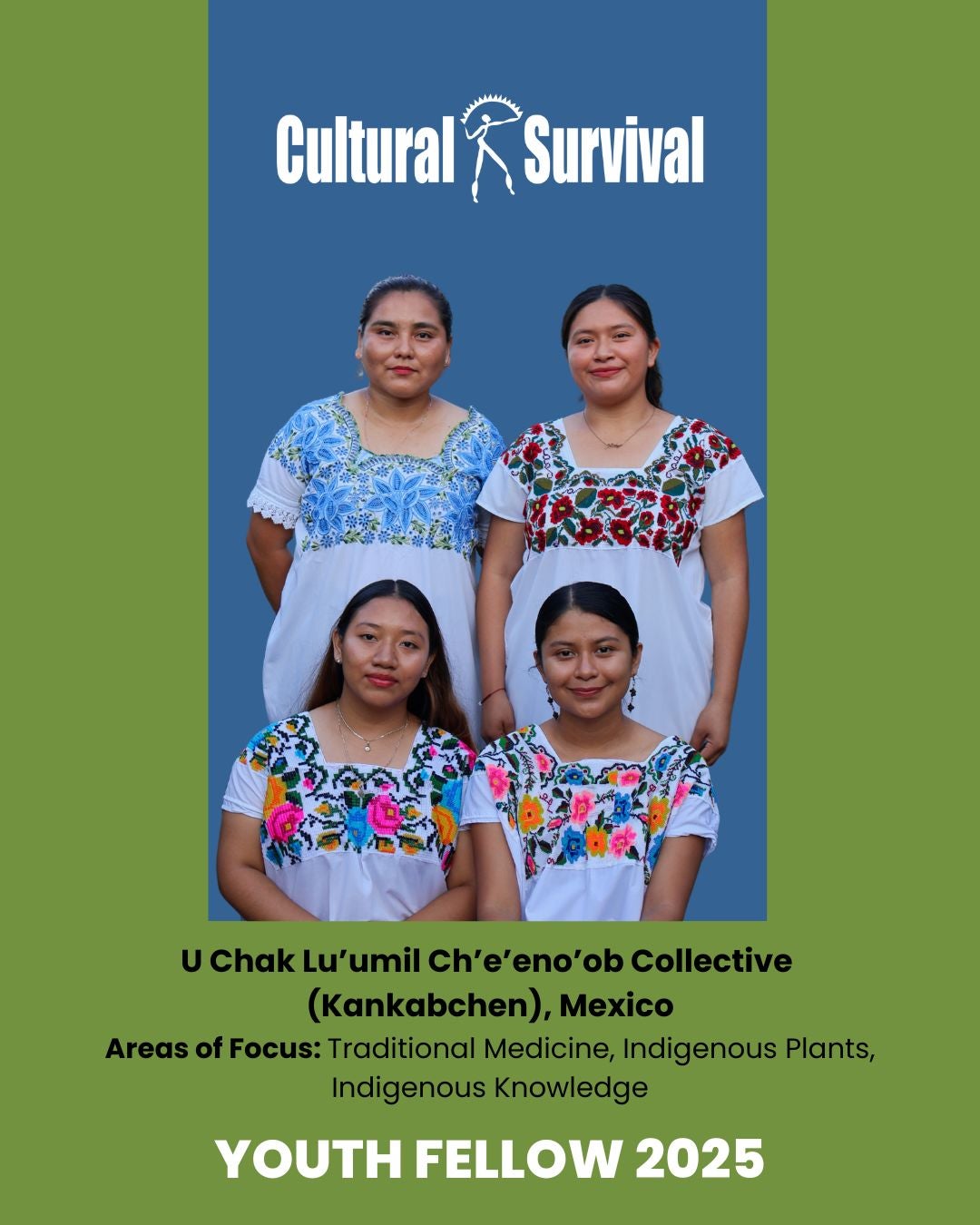
U Chak Lu’umil Ch’e’eno’ob Collective (Maya) from Mexico
Areas of Focus: Traditional Medicine, Indigenous Plants, Indigenous Knowledge
Nelly Cauich, Doris Tun, Brenda Pech, and Yeni Tun are Maya women from different generations who are members of the collective, U Chak Lu'umil Ch'e'eno'ob (Red Earth of Wells). They hail from Kancabchén, a small Mayan village located in the state of Quintana Roo, Mexico. Having grown up and studied together, some are now in the final years of their university education where they have learned to value their knowledge, strengthen their roots, and appreciate the significance of their culture. They also aspire for their community to recognize the great importance of this knowledge, and are working to maintain, preserve, and promote the culture, traditions, and wisdom of their ancestors. In 2022, the women collaborated to establish a small museum that showcases the significance of their community’s cultural, historical, and identity-related knowledge. Inspired by their grandmothers who practiced as midwives and utilized traditional medicine, they have become advocates for the preservation of traditional medicine practices that primarily use local plants.
Their fellowship project, “Ts'aak Wíinik (Healing Garden),” aims to rescue and preserve traditional Mayan medicine by documenting the knowledge of local Elders in the Kancabchén community through interviews, conserving medicinal plants in a botanical garden, educating youth and children through workshops, and creating a recipe book. These initiatives seek to ensure the transmission of this invaluable knowledge to future generations, protecting the cultural legacy of the community.
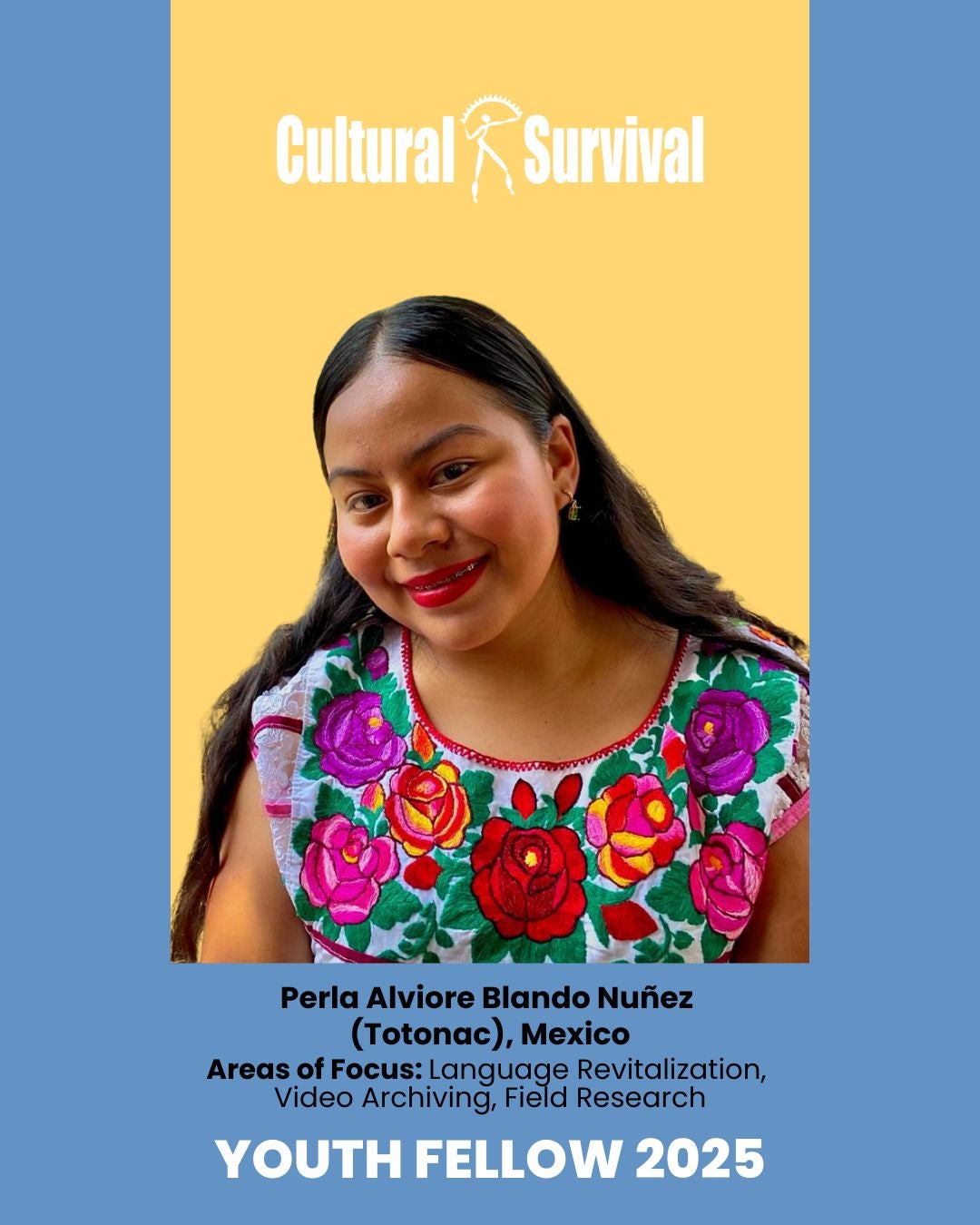
Perla Alviore Blando Nuñez (Totonac) from Mexico
Areas of Focus: Language Revitalization, Video Archiving, Field Research
Perla Alviore is a young Totonaca woman and a fourth-generation traditional cook, with a long lineage of bakers among her grandparents. Under her leadership, Perla has brought together the traditional cooks of her community to create the “Casa Escuela de Cocina Tradicional del Cedro” (Traditional Cooking School of El Cedro), a community school that offers free cooking classes to young people living in El Cedro, in Papantla, Veracruz. Currently, eight traditional cooks are participating in this initiative, which teaches young people in the community to nourish the body and soul in order to contribute to a culture of peace.
Her project, “Mi Tierra Totonaca y sus Ciclos” (My Totonaca Land and its Cycles), aims to revitalize the Totonaca language and traditional knowledge in Papantla, Veracruz. This initiative consists of creating informative videos about the local gastronomic and agricultural calendar in audiovisual format. The aim is for children in the region to learn the ingredients in the Totonaca language, so that the teachings of our grandmothers are not lost, thus promoting food sovereignty. The primary objective is to preserve the Totonaca language and ancestral knowledge, highlighting the importance of Totonaca cuisine as a cultural and spiritual pillar.
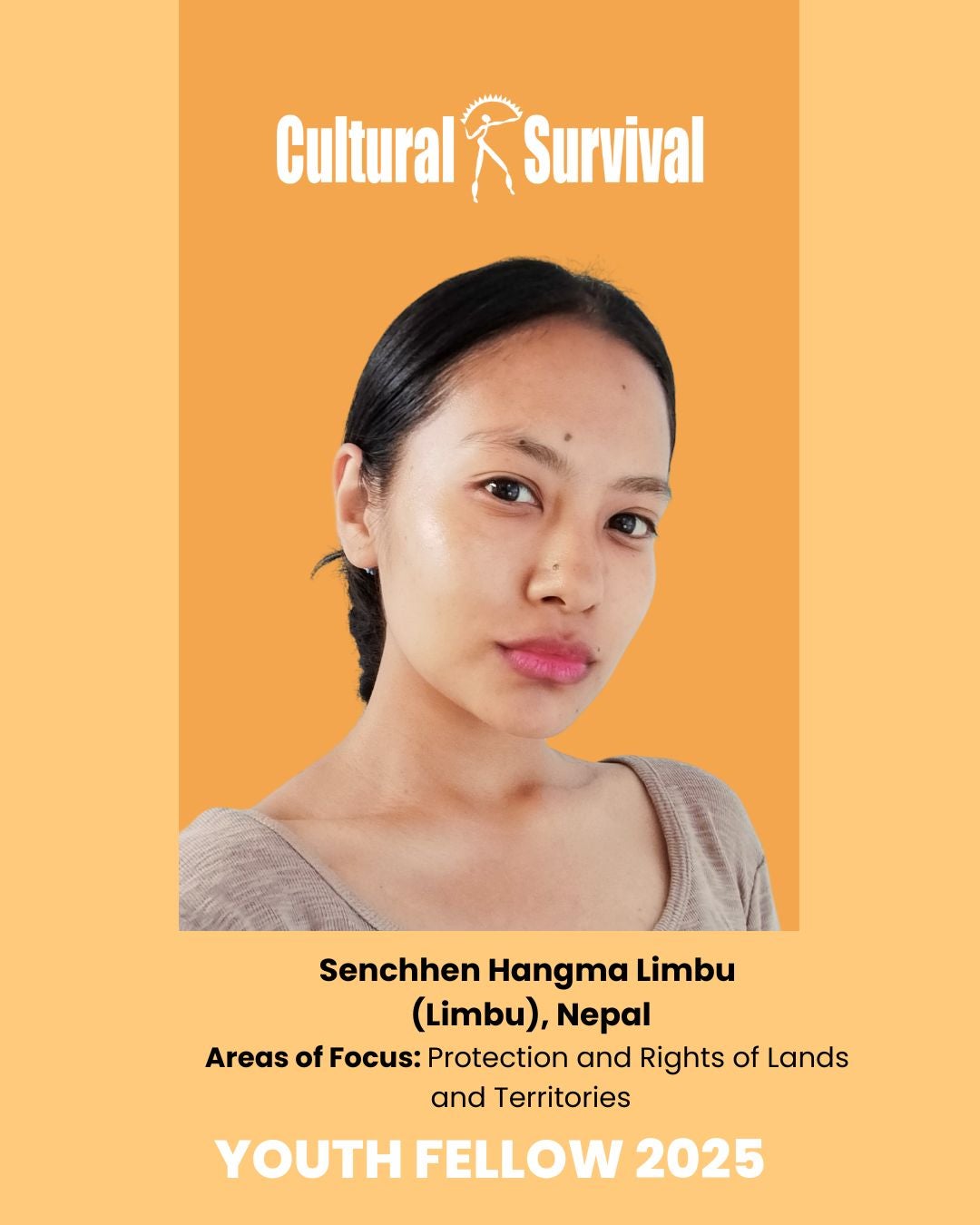
Senchhen Hangma Limbu (Limbu), Nepal
Areas of Focus: Protection and Rights of Lands and Territories
Senchhen Hangma Limbu (Limbu) is an advocate for Indigenous and environmental rights and a supporter of the Mukumlung Protection Movement, which advocates for the protection of sacred sites from ropeway construction for cable cars. She is currently an undergraduate law student at Tribhuvan University in Nepal. Her work includes researching and documenting violations of human rights and land and territory rights for NGOs and regional human rights bodies in Asia.
Limbu’s fellowship project aims to document and share information about violations of land, territory, resource, and human rights abuses occurring in Mukumlung due to governmental infrastructure development. Through audiovisual and digital documentation, the project seeks to amplify the voices of the Limbu People on social media and other digital platforms working to safeguard their sacred heritage sites.
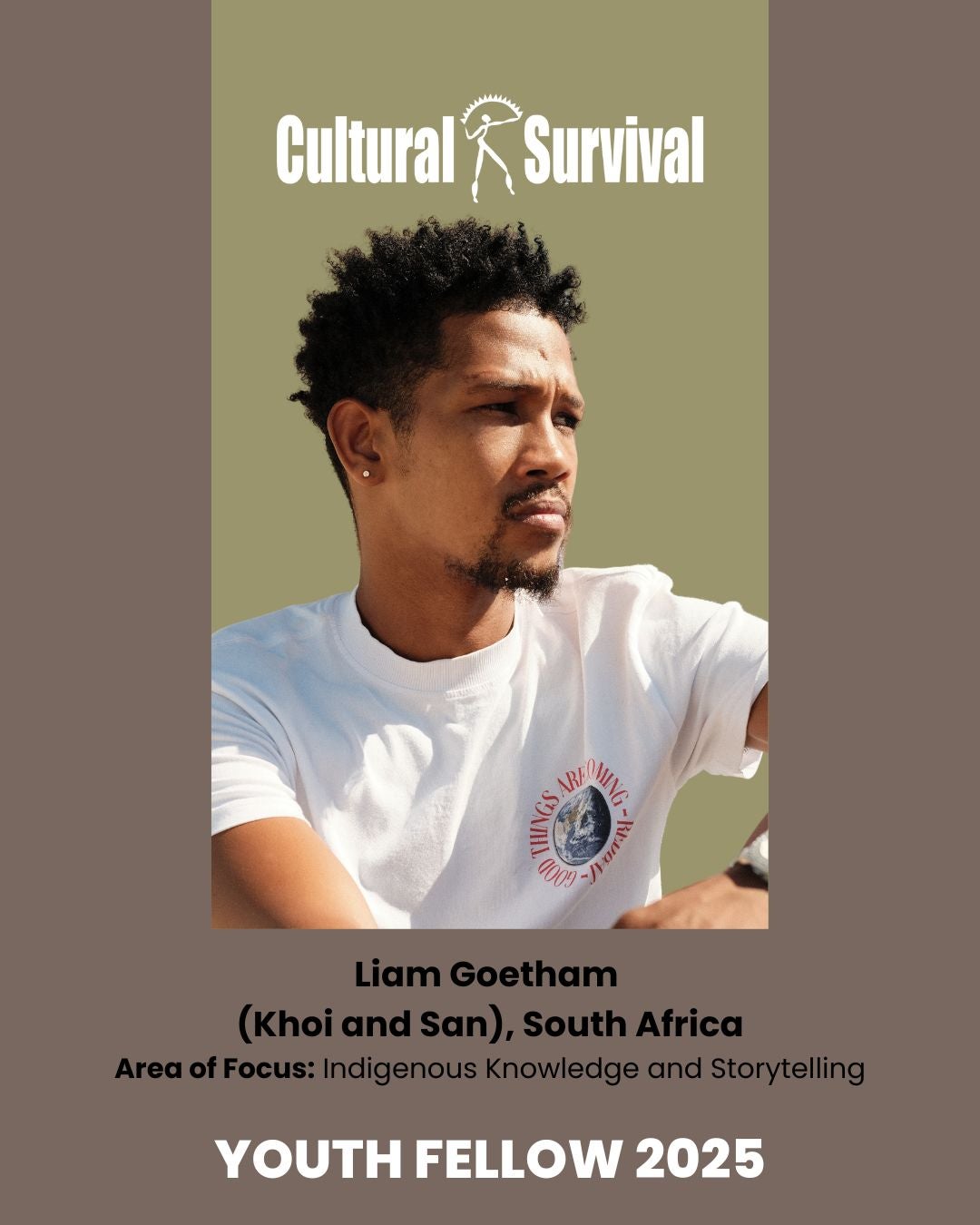
Liam Goetham (Khoi and San) , South Africa
Area of Focus: Indigenous Knowledge and Storytelling
Liam Goetham (Khoi and San) is a cultural activist and storyteller from the Khoikhoi First Nation Cocoqua in Paarl, Western Cape, South Africa. He is dedicated to revitalizing Indigenous languages, knowledge, and storytelling. Driven by a deep desire to understand the origins of his people, he joined the Munanai Collective, a community of Khoikhoi artists and activists who use the arts to challenge the erasure of Khoikhoi identity, language, and culture. Through his journey, Goetham discovered that his ancestors are represented in ancient rock art across Southern Africa, and that the Khoikhoi language, once widely spoken, has been systematically silenced. He believes that the voices of Indigenous Khoikhoi youth are vital to the khaima (resistance) against this erasure. As a result, he is committed to preserving his ancestral language and reclaiming the stories of his people before colonization.
Goetham’s fellowship project, "Sida Dommi (Our Voices),” aims to empower Khoikhoi First Nation youth from rural communities such as Paarl by equipping them with the skills and knowledge to share their stories through a series of podcasts.
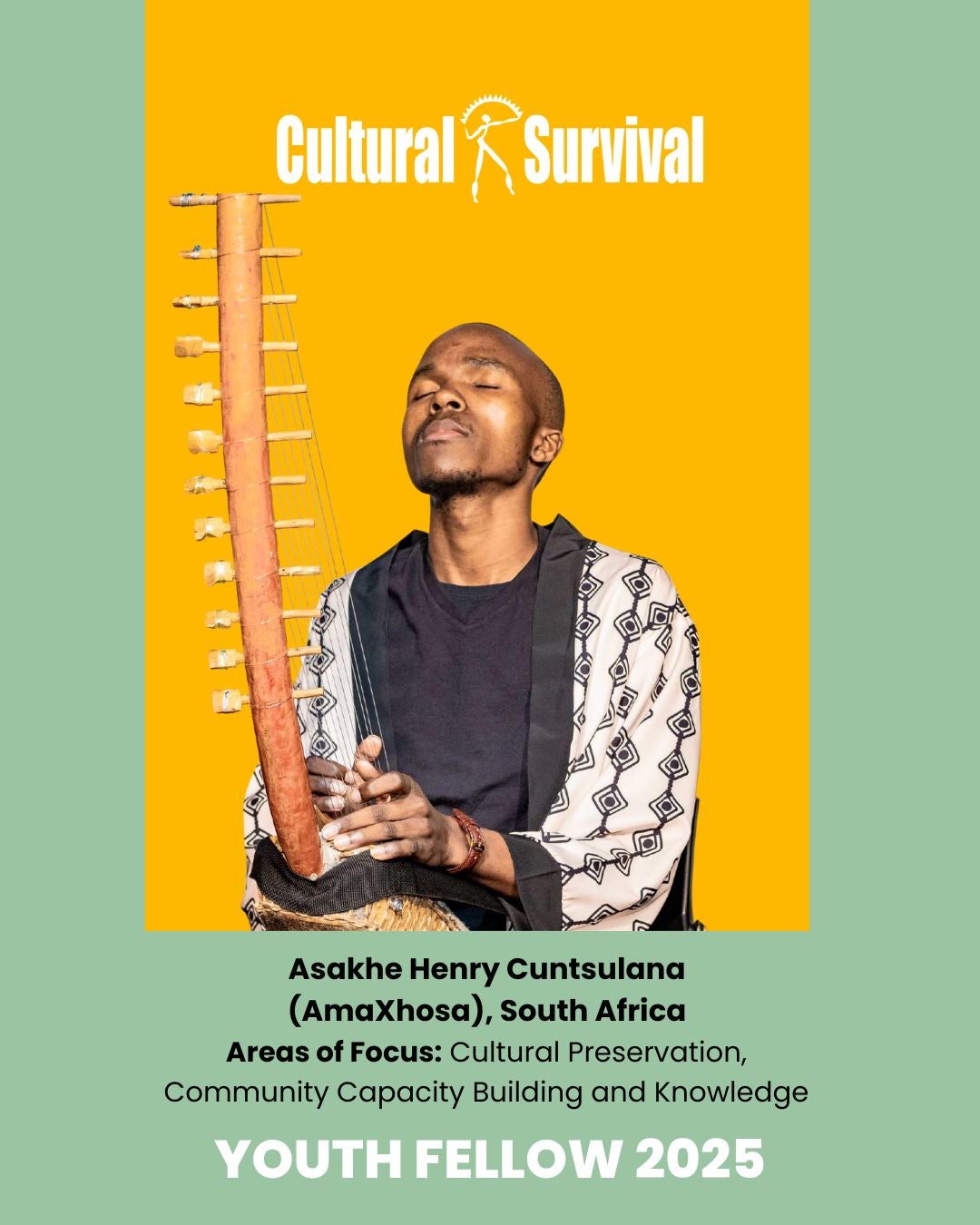
Asakhe Henry Cuntsulana (AmaXhosa), South Africa
Areas of Focus: Cultural Preservation, Community Capacity Building and Knowledge Transmission, Art and Multimedia
Asakhe Cuntsulana (AmaXhosa) is a South African musician, educator, and composer dedicated to preserving and creating Indigenous African music as a cornerstone for community healing and cultural heritage. A graduate of Rhodes University, he specializes in blending traditional African sounds with jazz and classical influences, crafting unique sonic experiences that transcend cultural and geographical boundaries. His work reflects a deep commitment to community healing, storytelling, heritage, and the revitalization of indigenous musical traditions.
Through his fellowship, Cuntsulana is developing "Ingoma yoHadi (Song of the Harp),” a groundbreaking project that explores the historical and cultural significance of the uHadi (Xhosa bow harp). He aims to safeguard and rejuvenate the cultural and historical importance of both the uHadi and Adungu instruments by creating an album and a book that document their narratives, playing methods, and significance in both contemporary and traditional music.
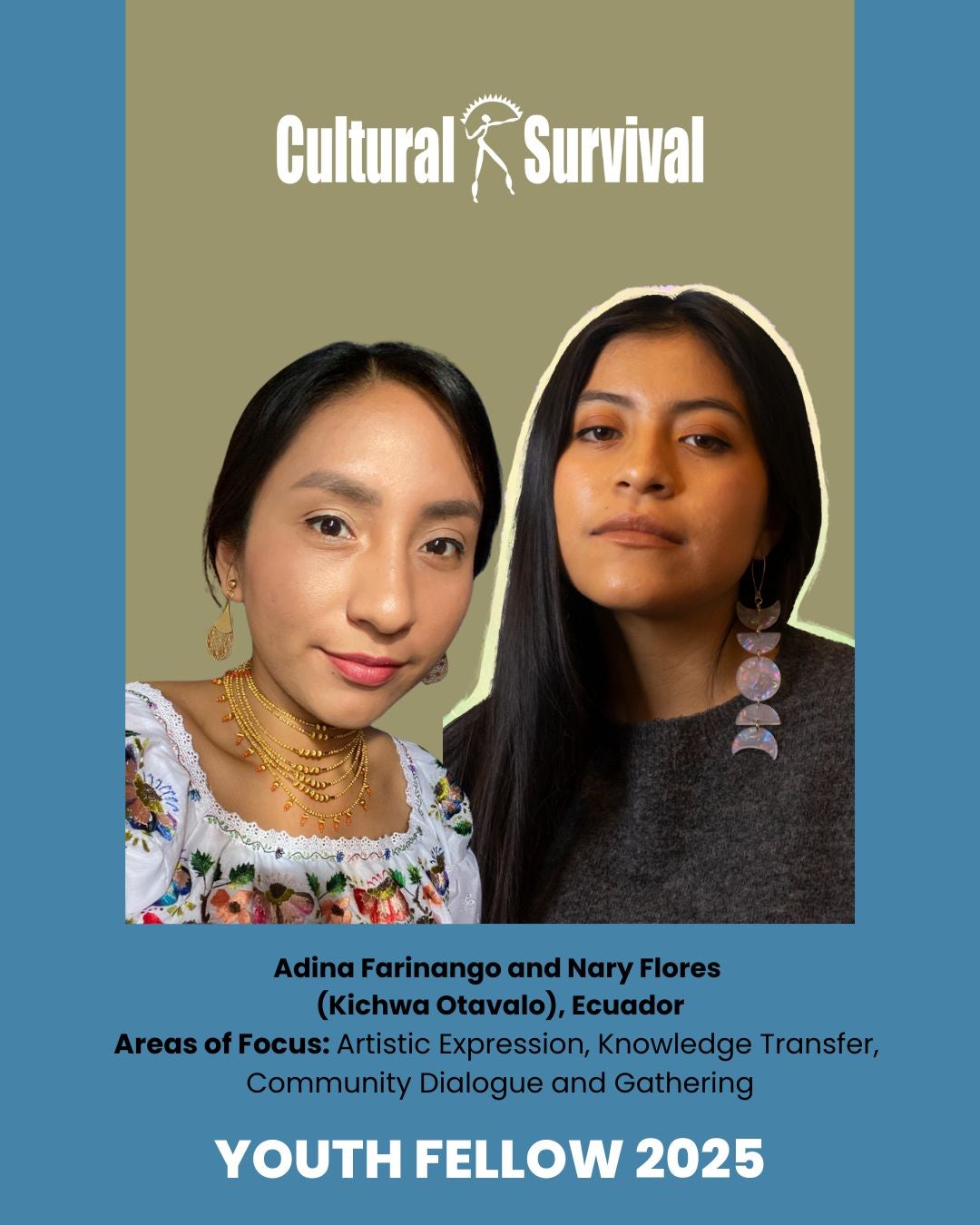
Adina Farinango and Nary Flores (Kichwa Otavalo), Ecuador
Areas of Focus: Artistic Expression, Knowledge Transfer, Community Dialogue and Gathering
Adina Farinango (Kichwa Otavalo) is an artist and designer currently based in New York. Her work delves into themes of identity, diaspora, and Indigenous futurism through various media such as digital illustration, photography, embroidery, and mixed media. Farinango sees art as an act of resistance, healing, and self-expression; a way to navigate and strengthen her identity as an Indigenous woman within the Kichwa diaspora. Inspired by the resistance of the matriarchs of her community, her work focuses on Indigenous identity and the reclamation of space from a matriarchal perspective. Rooted in ancestral and collective memory, her practice reflects on the concepts of home, belonging, and resistance of Indigenous art in the face of colonial violence. Through visual storytelling, she aims to foster intergenerational dialogue and celebrate Kichwa futurisms, ensuring that indigenous knowledge and art continue to thrive.
Nary Flores (Kichwa Otavalo) is an environmental consultant from Otavalo, Imbabura, Ecuador. She is passionate about sustainability and integrates eco-conscious practices into her work and daily life, advocating for environmental responsibility in Indigenous communities.
Together, they will implement the collective project, “Wiñaymuyu (Seeds that Grow).” This initiative aims to empower Kichwa youth through art, fostering self-expression, emotional awareness, and cultural pride. The project includes various artistic activities such as drawing, painting, collage, and mixed media, and integrates intergenerational dialogue with taytas/mamás (wise Elders/experts) and artisans. Through these activities, “Wiñaymuyu” aims to revitalize Kichwa identity and promote cultural resilience. The project will culminate in a collaborative mural and community celebration, documenting the process to create a visual archive. It also incorporates elements of Kichwa futurism, encouraging youth to imagine a thriving cultural future.
